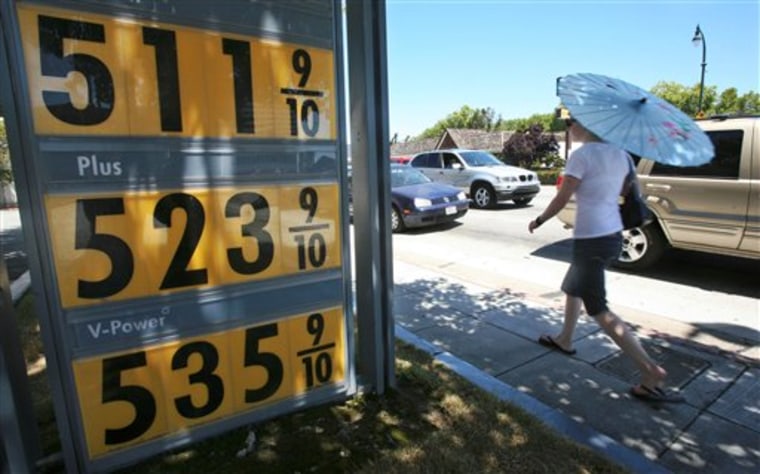Damien Barilko, co-founder of the Paris electric bike company Velocito, said sky-high gas prices have finally succeeded where environmental campaigners and governments have failed: persuading motorists to go green.
Many customers who have done the math are laying down $4,600 on eco-friendly bikes, but their reasons are different from those of Barilko, who said he likes the product because it is "a clean mode of transportation."
"Most people come for economic reasons. The ecological reasons are an afterthought," he said. Nevertheless, sales have doubled each year since Barilko opened his first store in 2005.
While consumers and governments struggle with steep oil prices, one of the biggest questions looming over the global economy is this: Will costs ever come down? Unlike the energy crisis of the 1970s, when the world assumed the spike was temporary, high energy prices could be here to stay, according to oil experts.
"The power of the market is far more powerful than the government," said Platts Global Director of Oil John Kingston. "Most people are convinced that this is not going to go away."
Oil rose last week to nearly $140 a barrel — a once-unimaginable level. There are signs that eye-popping prices are curbing the appetite for oil in developed countries, but economists and energy experts said the rules have changed, and that might not even matter anymore.
The International Energy Agency predicts global demand for petroleum products such as gasoline, diesel and heating oil will grow by 0.9 percent, or 800,000 barrels a day, in 2008. That's down from the 1.2 percent, or 1 million barrels, the IEA forecast earlier this year.
But demand in developing countries, particularly China, continues to accelerate, according to the Paris-based energy watchdog.
"Whatever cuts are made today by the major players of 30 years ago are all going to be eaten up by nations that weren't even on the radar screen then," said Global Insight analyst Mary Novak. "There is no more supply. There is only demand."
Developing nations have subsidized fuel to ensure peace and to support economic growth. But those policies have begun to falter.
Malaysia and India, groaning under the weight of high fuel prices, have just begun cutting subsidies. Analysts such as Michael Lynch of Strategic Energy & Economic Research in Winchester, Mass., said others will follow.
"At this level of prices, very few countries can afford subsidies if they are importing," he said.
But there is political pressure to help consumers being hurt by high prices.
On Thursday, Spain entered its fourth day of a truckers strike, which has snarled roads and led to the arrests of 71 people.
Meanwhile, protest groups in Malaysia vowed to push ahead with mass demonstrations against a 41 percent increase in gasoline prices. There have been similar protests in South Korea, Belgium, Thailand, Scotland, Poland, the U.S. and elsewhere.
French President Nicolas Sarkozy has urged his EU partners to suspend part of the value-added taxes, but his proposals have found few takers in other European capitals. Nor has Italy been successful with its proposal for a "Robin Hood" tax on oil profits.
"In the short term, changes will be seen mostly in the actions of the consumer," said Manouchehr Takin, an analyst at the Center for Global Energy Studies in London. He predicts an even smaller increase in demand than the IEA.
The high crude prices have begun to force changes that will not soon be reversed.
General Motors Corp. is closing four North American plants that make trucks, as more consumers look for smaller cars, which are often manufactured overseas.
Americans, the world's largest gas guzzlers, are also buying less gas, which hit another record on Thursday, the latest in a string of all-time highs.
Businesses are restricting travel and opting for teleconferencing to reduce costs, as well as trying to pass some of their increased fuel bills onto consumers.
Airlines have raised fares repeatedly, but can't cut costs fast enough to cover the rising cost of fuel. Southwest Airlines recently revealed it is flying slower and will save $42 million in fuel this year by extending each flight by one to three minutes.
Saudi Arabia, the world's largest oil producer and the most influential member of the Organization of Petroleum Exporting Countries, believes the sustained high prices will eventually slacken the world's appetite for oil.
OPEC has been reluctant to increase production, arguing that prices are being set by speculators, not oil availability.
That view is supported by Paul Stevens, a researcher on the energy, environment and development program at Chatham House, a London think tank for international affairs. He said prices could "come down very quickly or very significantly" by as much as $50 a barrel.
But there is a divide among industry analysts and policy makers, some of whom said only one thing has driven oil prices throughout history: demand.
The U.S. Energy Department said prices at the pump will probably stay around $4 per gallon through much of next year.
In 2009, crude oil is expected to average $126 per barrel — $4 higher than this year, the head of the federal Energy Information Administration told lawmakers this week. The Energy Department said there may be a brief dip in crude by 2010, but the long-range expectation is for more expensive oil.
"This looks different," said Novak, of Global Insight. "Price spikes in the past were event driven, and that does not appear to be the case here."
